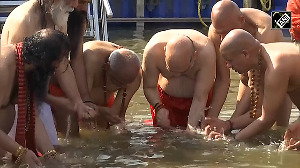Nine mega-projects in the mineral-rich Chhota Nagpur plateau, which could add substantially to India's metal output and create a large number of jobs, are stuck over messy issues related to land acquisition, rehabilitation of displaced people, mining rights and plain politics.
The statistics on their current state are startling. Only about a quarter of the 40,000-odd acres required for the nine projects is in the possession of the promoters, just one of them has been recommended for grant of licence to prospect for iron ore mines and none is anywhere close to meeting their completion deadline (all nine projects had talked of going on stream in 2009 and 2010).
This is the state of affairs two to three years after leading Indian business houses like Tatas, Ruias and Jindals, as well as multinational corporations like Arcelor Mittal and Posco signed MoUs with Orissa, Chhattisgarh and Jharkhand for these projects.
At stake is annual production of 48.10 million tonnes of steel, 2 million tonnes of alumina and 760,000 tonnes of aluminum. To put it in perspective, the country currently produces around 32 million tonnes of steel, three million tonnes of alumina and 1.3 million tonnes of aluminum.
The proposed investment in the nine projects is Rs 1,77,188 crore (Rs 1,771.88 billion). It will create employment for close to 1,70,000 people, 60 to 70 per cent of which will be indirect, and result in an annual revenue of Rs 17,619 crore (Rs 176.19 billion) for the centre and Rs 81,624 crore (Rs 816.24 billion) for the three states.
However, the progress has been tardy. The land required for the nine projects is 39,909 acres. Of this, only 11,126 acres, or 27.87 per cent, has been acquired. The land sought for these projects includes private land, government land as well as forest land.
Companies implementing these projects said that land owners, as well as squatters on government-owned land, are asking for more than the prevailing rates. For example, at Paradip,where Posco and Essar are putting up their projects, the price of private land two years back, when the projects were announced, was between Rs 100,000 to 200,000 per acre and this has now gone up to Rs 600,000 per acre. But villagers are demanding Rs 40 lakh (Rs 4 million) per acre.
Those who have encroached on government land are demanding Rs 25 lakh (Rs 2.5 million) per acre, though the prevailing price is as low as Rs 25,000 per acre. They are also demanding rehabilitation including jobs in these projects, though the present resettlement and rehabilitation policy prescribes such benefits only to genuinely displaced persons and not to encroachers.
Also, Orissa alone, of the three states, has an R&R policy in place, though thousands of families in the three states will be displaced.
The problem is not small. The extent of government land required for all the nine projects is not known as the land and socio-economic survey for none of the projects is complete so far.
But, experts said, the acquisition of government land, which otherwise should have been smooth, has become cumbersome because of encroachment and presence of patches of forest land within it.
For Posco, out of the total 4,004 acres it requires, as much as 3,566 acres is government land which includes 3,090 acres of forest land. For the Arcelor Mittal project, 3,250 acres of the total 7,750 acres is government land. For Tata Steel's Kalinga Nagar project, the entire 3,040 acres is government land but is encroached by locals who sold their land to the government in the mid-1990s.
Then there is forest land. The Arcelor Mittal project includes 431.55 acres, Jindal Steel and Power 400 acres and Essar 30 acres. These companies have all applied to the Centre for conversion of this land for industrial use, though no permission has so far been granted.
If this is the extent of problems, why, then, are the companies still interested in the projects? It is for the access to the rich mineral deposits in the region that these projects will get.
Both Posco and Arcelor-Mittal have gone to the press saying that without mining leases they will not go ahead with their projects. The iron ore reserves sought for captive use by these mega-projects add up to 2.14 billion tonnes over a period of 30 years (the country's recoverable reserves stand at 12.3 billion tonnes) and six million tonnes of bauxite annually.
However, only Posco's name has been recommended for the grant of a licence for prospecting of iron ore deposits in Orissa. This, too has, been contested in the courts by the Kudermukh Iron Ore Company Ltd and other claimants for the same property, delaying the grant of the licence.
Orissa is sitting on about a third of the country's recoverable iron ore deposits. But for each mine, there are at least 200 claimants. As and when a prospecting licence is handed out for any mine, more litigation is expected.
Queering the pitch further for the mega-projects are the anti-industry lobbies headed by NGOs, civil rights groups, ultra-left organisations as well as mainline political parties sitting in opposition in respective states.
In the name of protecting the rights of local people and opposing their displacement on humanitarian grounds, they have built up mass movements at different places - often turning to violent clashes with the administration, as it happened in Kalinga Nagar and Nandigram - which have hindered the progress of these projects significantly.
At both the Posco site and Kalinga Nagar, more than a dozen ultra-left organisations and NGOs are actively working in tandem with the local anti-project groups to not only stall work on the projects but also hinder the process of rehabilitation of the affected people by the administration.
On the other hand, observers have said that had it not been for the ruckus raised over the Kalinga Nagar firing, which claimed the lives of 14 anti-industry tribal agitators, the Orissa government would not have come out with such a comprehensive R&R policy which is acclaimed as being one of the best in the country.
The Congress is driving the Posco project at the Centre, branding it the largest single-location FDI venture in the country. The same party, sitting in opposition in Orissa, is the opposing the project in the state because of political compulsions.
"We have to oppose it, otherwise the ruling party will take all the mileage", says a senior MLA of the party. "Of course, it is another matter that we ourselves would not like to let such huge investment shift out of the state if we are elected to power tomorrow," he confided.
The fate of the nine projects, meanwhile, hangs in balance.







 © 2025
© 2025